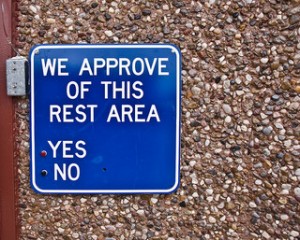
If you’ve ever taken a survey, you know what it’s like to feel limited in giving an opinion: a simple “agree” or “disagree” doesn’t always capture the complexity of opinions; a few blank lines may leave too much room for you to be clear in your response; or maybe you don’t have an instant opinion when probed about a given subject, but you heard your mom talking about it, you feel forced to pick a side, and you quickly regurgitate her opinion.
These are only a few reasons sociologist Herbert Gans warns that “public opinion polls” can’t live up to the name. As he points out in an article from the Nieman Journalism Lab:
If poll results can be interpreted as opinion, they are pollster-evoked or passive opinions. They are not the active opinions of citizens who feel strongly about, or participate in some way in the debates about forthcoming legislation or a presidential decision.
Gans explains the differences between “answers” and “opinions,” and suggests that the media start informing its audiences on this subject. He also believes that the media should start offering more context around public opinion poll results to illustrate what the public is actually thinking. As it stands, communications to elected officials or involvement in town-hall meetings and demonstrations may be far more representative of a given community’s “opinion” than poll results.

Comments 3
Jolie — May 8, 2013
Broke graduate student/freelancer here- my current job is to do door to door opinion polls.
Stuff I keep noticing:
1. People often have a hard time imagining "on a scale from 1 to 5"; or the fact that the answer to "on a scale from 1 to 5" can't be "Yeah, I guess...". Thank Goddess for showcards though; sometimes I just run my finger on the showcard to explain them; but no odea how those unfortunate souls who have to do it through the phone manage it.
2. Sometimes people don't feel like answering thinking too hard about the questions; they're like- going very quickly: "yes, no, yes, yes, tend to agree, tend to agree- how many more questions do we have left?" Sometimes I wonder if yhey actually listen to the question...
Also, vvery telling: there was a very popular prank in Romania back in the 90's- a guy was pretending to be from the news and interviewing people for their opinion- but actually concerning completely made-up issues, and throwing a commonly confused word in the mix to make it funny (English language equivalent questions would be: "A couple of thespians are petitioning the State for their right to marry each other; do you agree or disagree? Do you believe in marriage between thespians?"; or "Rumours claim that senator Rick Santorum is a homo sapiens; do you believe this?" or "Are you concerned about illegal immigrants taking away hand jobs from hardworking Americans?". Every time, there were enough respondents willing to give the guy a piece of their mind, and who appeared to have very strong opinions on the issuee of, say "how pollution causes the birth of bipedal children". (That was a real one actually!)
Makes you think...
Friday Roundup: May 10, 2013 » The Editors' Desk — May 10, 2013
[...] “An Opinion on Public Opinion Polls,” by Carolyn Lubben. Herb Gans in the Neiman Journalism Lab on why public opinion reports can be awfully misleading. [...]